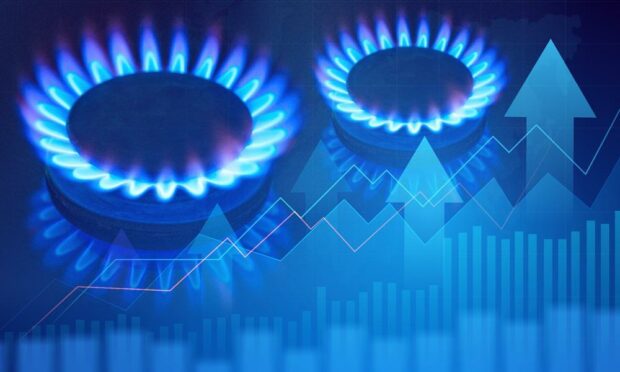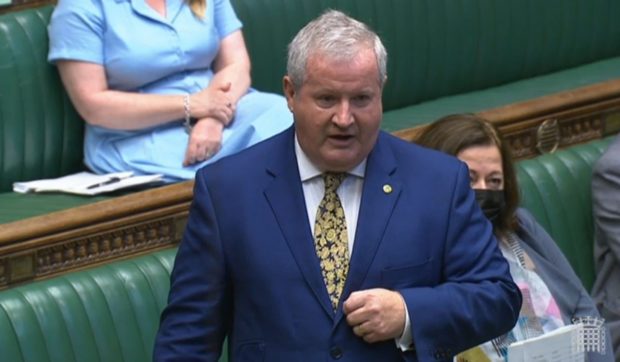Millions of households across the UK will see their household energy bills soar by almost £700 in April amid a cost of living crisis.
Gas prices have risen by unprecedented levels across the globe in recent months, causing energy bills to rise dramatically.
Estimates have suggested the latest energy price cap announcement could push a further 211,000 households in Scotland into fuel poverty in the coming months.
Here we take a look at all you need to know about the cause of the unfolding crisis, what government support is on offer and what lies ahead:
What is the energy price cap?
The energy price cap is the maximum price suppliers can charge households in Scotland, England and Wales on a standard tariff for a six-month period.
Introduced in 2019, it is based on a number of factors including the wholesale cost of power in the previous six months.
Energy regulator Ofgem announced on Thursday it will hike the price cap to a record £1,971 for a typical household as gas prices soared to unprecedented highs.
The decision is likely to affect 22 million households across the UK, and applies to those who are on their energy supplier’s default tariff.
What does that mean for energy bills?
Household energy bills will soar by £693 per year on average in Britain from the beginning of April, Ofgem confirmed.
It will be worse in the rural north of Scotland.
For customers with prepayment meters the price cap will go up by £708 to £2,017.
The rises will come into force from April 1, when the price cap for energy bills is updated for the next six months.
NEWS: The price cap will rise by 54% on 1 April lasting until 1 October. For someone on typical bills that's a rise from £1,277 to £1,971/yr – just under £700.
I will try and find the standing charges and unit rates now.
— Martin Lewis (@MartinSLewis) February 3, 2022
The energy regulator also plans to set out new rules on Friday which will allow it to change the energy price cap in between its regular six-month reviews.
It says this will only be used in exceptional circumstances, and five tests will have to be passed before it can step in.
Around 15 million homes already saw their energy bills increase by 12% when the price gap was last updated in October.
Why are energy prices going up?
The reason gas prices are soaring is due to a combination of factors and the problems are international.
Prices have been rising worldwide due to an increase in demand on oil and gas, which has pushed prices to unprecedented levels.
The price of gas quadrupled as a result of a cold European winter last year that drained supplies. There was increased demand in Asia, at the same time as countries such as China moved away from coal.
There were also concerns about a possible Russian invasion of Ukraine.
Speaking in the Commons on February 3, UK Chancellor Rishi Sunak said “it is more expensive for companies who supply our energy to buy oil, coal and gas”.
He added: “Of the £693 increase in the April price cap, around 80% comes from wholesale energy prices.
“Over the last year, the price of gas alone has quadrupled and because over 85% of homes in Britain are fitted with a gas boiler, and around 40% of our electricity comes from gas, this is hitting households hard.”
What is the government doing to help?
The chancellor said all households across the UK will get a £200 discount on bills from October.
But this sum will later have to be repaid from people’s bills in equal £40 instalments over the next five years so is in essence more of a loan.
Homes in England will also get a £150 council tax rebate for properties in bands A-D.
Local taxation is a devolved matter so Scotland will receive a lump sum of £290m from the UK Treasury.
First Minister Nicola Sturgeon said the measures outlined by Mr Sunak are “welcome steps” to help mitigate the rising price cap, but they “do not go far enough”.
In a statement issued later on Thursday, SNP Energy Secretary Michael Matheson said the Scottish Government will “carefully assess” the measures announced by the chancellor.
He added: “I am concerned that the majority of these measures are not sufficiently targeted to provide support to those who need it most, and that the proposed £200 rebate is too little too late, applying six months after the coming price rise in April”.
Powers relating to the energy markets remain reserved to Westminster and the SNP minister said he – and ministerial colleagues – have “repeatedly called” for the UK Government to take further steps – including a reduction in VAT and targeted support for those on low incomes.
What has the reaction been like?
Leading advice charities described the decision to hike home energy bills by more than half as a “hammer blow” for Scottish households.
Derek Mitchell, Citizens Advice Scotland’s chief executive, said: “One in three of us already find bills unaffordable and, shamefully, almost half a million people in Scotland have had to cut back on food to deal with unaffordable bills.
“This simply isn’t a sustainable position for people.”
Andrew Bartlett, chief executive of Advice Direct Scotland, said the price cap increase will leave “many people facing the stark choice of heating or eating”.
The SNP’s Westminster leader Ian Blackford said the announcements by Mr Sunak were “utterly inadequate” and amount to a “Tory con trick” with a “£200 ‘buy now, pay later’ loan”.
Meanwhile, Scottish Labour leader Anas Sarwar said the energy price increase will cause “pain and distress for hundreds of thousands of people across our country”.
He called on the SNP to back Labour’s proposals for a windfall tax on North Sea oil and gas companies.
The Labour MSP added: “The SNP – siding with the Tories and big energy companies, while Labour – on the side of hard-pressed Scots”.
When will prices come down?
Prices are likely to remain elevated for several years, the gas markets suggest.
There are also fears about next winter, when experts predict the cap to rise even further – to £2,329.
However, this prediction is likely to change if Ofgem makes changes to how it calculates the price cap, which it is expected to do.



